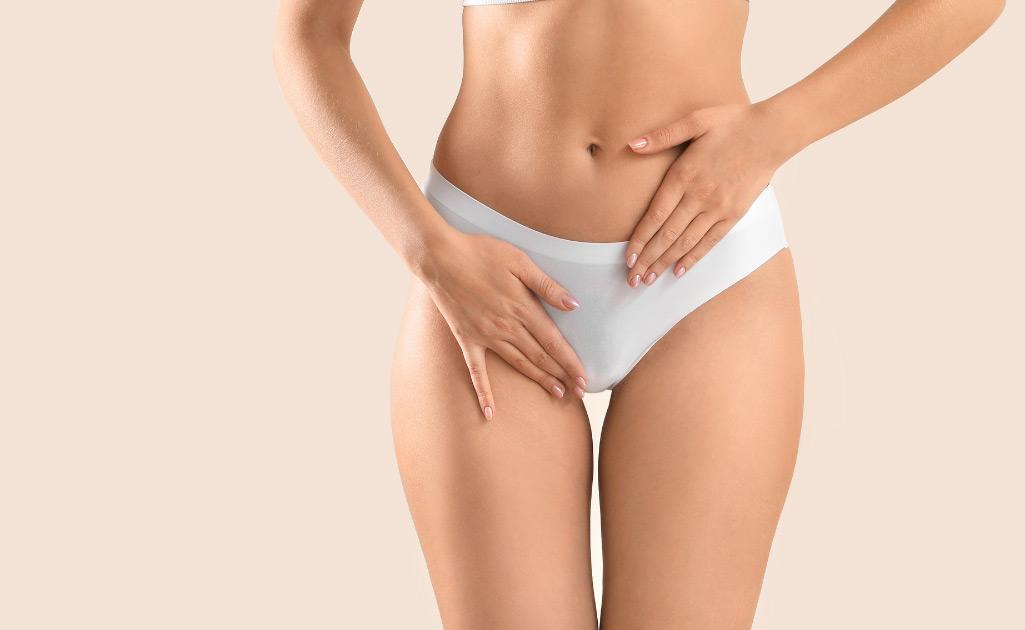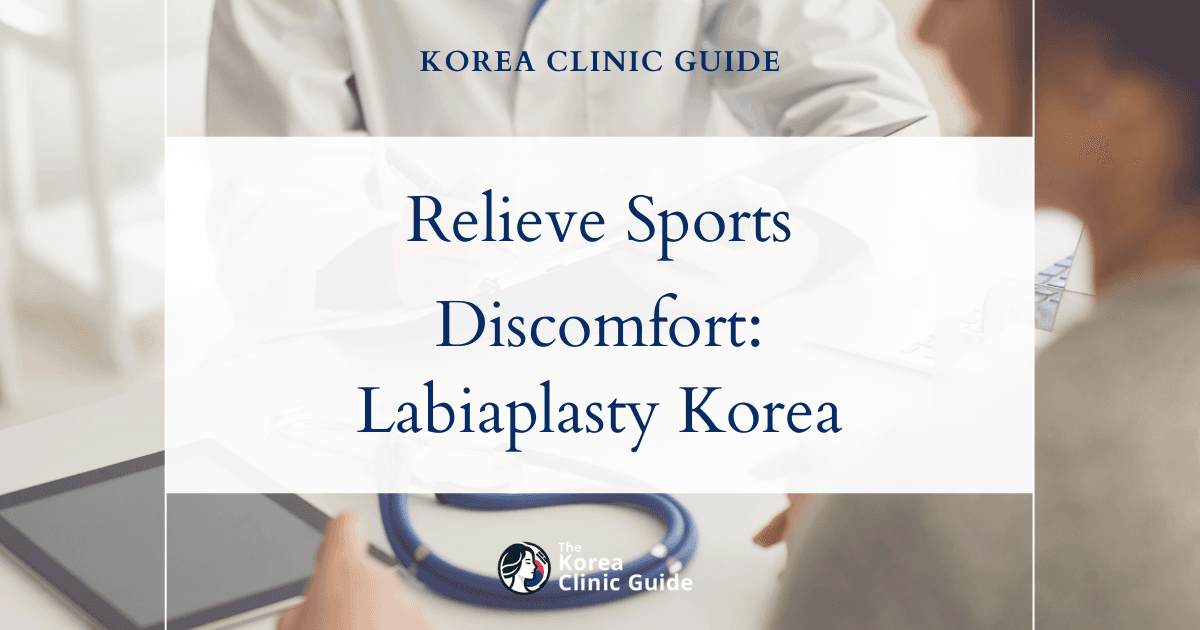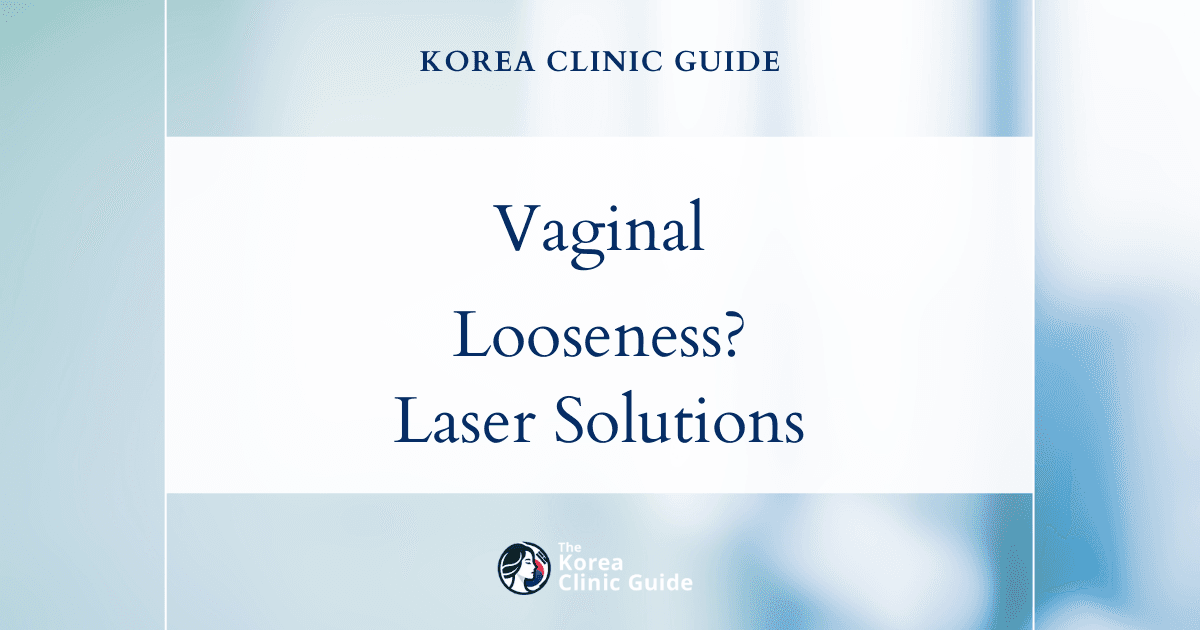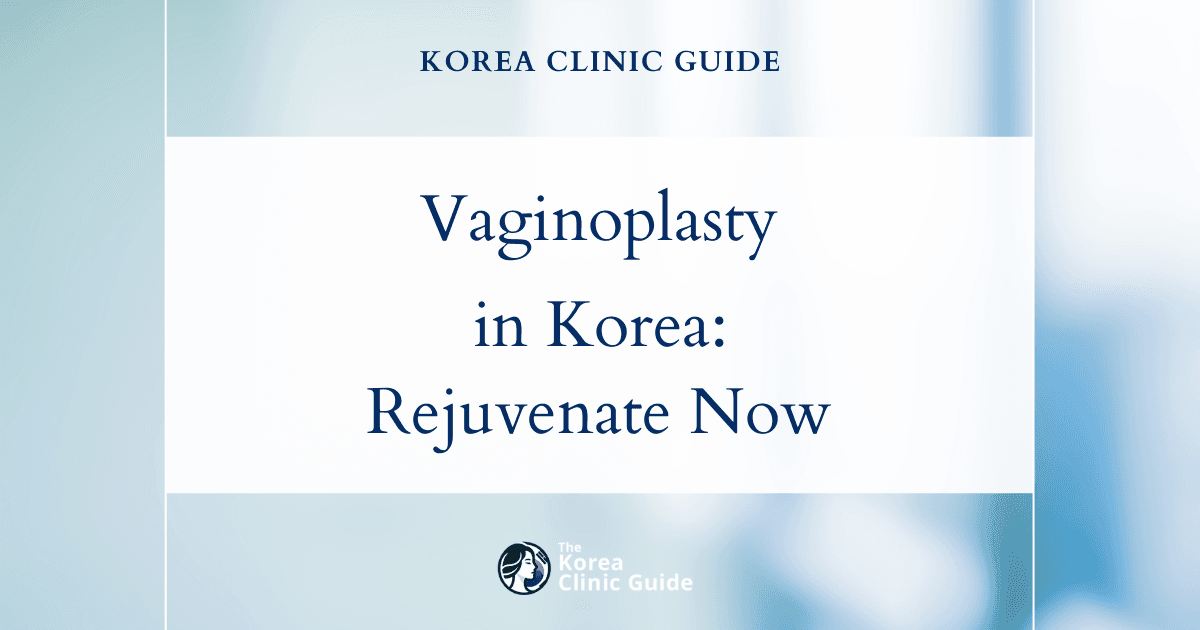Medical Tourism Blog
Vaginal Dryness in Korea | Best Clinics, Costs, Procedure Types & More

Table of contents
- What Is Vaginal Dryness?
- Best Clinics in Korea for Vaginal Dryness
- Getting Vaginal Dryness in Korea
- Cost of Vaginal Dryness in Korea
- Alternatives to Vaginal Dryness
- Conclusion
Considering treatment in Korea? Everything you need to know e.g. — how to avoid scams, visas, interpreters, recovery tips — in our Medical Tourism Master Guide. Plan with confidence in minutes, not weeks!
Have you ever considered how a topic as intimate as vaginal dryness can shape the lives of countless women? In Korea, where open discussions about women's health are gaining momentum, this article delves into the challenges and solutions surrounding vaginal dryness, offering insights into cultural perceptions, treatment options, and innovative approaches that are helping women lead more comfortable lives.
What Is Vaginal Dryness?

Vaginal dryness is a medical condition characterized by an insufficient lubrication of the vaginal walls. This condition can affect women of any age but is particularly prevalent during and after menopause due to significant hormonal changes. While the production of natural lubrication is a normal physiological process that maintains the comfort and health of the vaginal tissues, a decrease in this lubrication can lead to a number of uncomfortable symptoms.
The primary cause of vaginal dryness is often a decrease in estrogen levels. Estrogen is a hormone crucial for maintaining healthy vaginal tissue by promoting blood flow and ensuring adequate moisture retention. During menopause, a woman's estrogen levels significantly drop, causing the vaginal walls to thin and become less elastic, leading to a decrease in lubrication. Other factors that may lead to a reduction in estrogen include breastfeeding, childbirth, certain medications (like antihistamines and antidepressants), and cancer treatments such as chemotherapy and radiation therapy.
Symptoms of vaginal dryness can vary but generally include irritation, itching, burning sensations, and pain or discomfort during intercourse, often referred to as dyspareunia. Affected individuals might also experience recurrent urinary tract infections or an increased urgency to urinate, as these conditions can be exacerbated by decreased lubrication.
From a diagnostic perspective, healthcare providers will consider a patient's medical history, perform a pelvic examination, and possibly recommend hormone level testing to establish a clear understanding of the underlying cause of the dryness. In some cases, further testing may be necessary to rule out other conditions with similar symptoms, such as infections or dermatological issues.
Treatment for vaginal dryness depends on its underlying cause and severity. Non-hormonal therapies can include over-the-counter vaginal moisturizers and lubricants, which help to relieve dryness temporarily and make intercourse more comfortable. For those seeking longer-term solutions, particularly when the dryness is due to low estrogen levels, hormonal treatments may be suggested. These can include localized estrogen therapy such as vaginal creams, rings, or tablets, which aim to restore moisture and elasticity to the vaginal tissue.
In South Korea, awareness and treatment for vaginal dryness have gained more attention in recent years. Women's health clinics are increasingly offering specialized care and counseling to help address this often-taboo subject, enabling women to seek help without embarrassment. Cultural stigmas around discussing intimate health issues are gradually diminishing, creating a more supportive environment for those affected by vaginal dryness to find relief and enhance their quality of life.
Best Clinics in Korea for Vaginal Dryness
Listed below are the best clinics in Korea for vaginal dryness:
| Clinic Name | Key Features | Special Techniques |
|---|---|---|
| SH Clinic | Specialized women’s care center that combines stem-cell science and gynecology within a multi-specialty medical setting; all surgeries and procedures performed directly by a highly experienced, board-certified gynecologist recognized with a commendation from the Minister of Health and Welfare; comprehensive, patient-focused plans with attentive pre- and post-care in a discreet environment. | Non-invasive vaginal HIFU rejuvenation (remodels collagen and helps relieve dryness); vaginal fillers; stem cell injections; vaginal tightening; implant surgery; supported by the SH Stem Cell Center’s personalized regenerative therapies. |
SH Clinic
SH Clinic in Sinsa, Seoul is a specialized women’s care center that combines stem-cell science and gynecology within a multi-specialty medical setting. All surgeries and procedures are performed directly by our highly experienced, board-certified gynecologist—recognized with a commendation from the Minister of Health and Welfare—ensuring expertise, continuity, and comfort for female patients.
For vaginal dryness, the SH Gynecology Clinic provides a full spectrum of options tailored to your needs, from non-invasive vaginal HIFU rejuvenation that remodels collagen and helps relieve dryness, to vaginal fillers, stem cell injections, vaginal tightening, and implant surgery when appropriate. Supported by the SH Stem Cell Center’s personalized regenerative therapies, each treatment plan is comprehensive and patient-focused, with attentive pre- and post-care in a discreet environment.
You can check out their website here: SH Clinic Website
Getting Vaginal Dryness in Korea
Vaginal dryness is a common condition that affects many individuals, especially post-menopausal women, but it can occur at any stage of life due to various factors such as hormonal changes, stress, certain medications, or underlying health conditions. In Korea, healthcare for addressing vaginal dryness has seen significant development with an emphasis on innovative and holistic treatment options, integrating both traditional and modern medical approaches.
Understanding Vaginal Dryness
Vaginal dryness is characterized by the thinning and inflammation of the vaginal walls due to a decrease in estrogen levels. Symptoms can include itching, burning, and painful intercourse, impacting quality of life and intimacy. In Korea, cultural attitudes towards sexual health are gradually becoming more open, allowing for better communication and treatment of conditions like vaginal dryness.
Diagnosis
In Korea, the diagnosis of vaginal dryness typically begins with a comprehensive evaluation by a gynecologist. The process often includes:
- Medical History Review: Doctors take a detailed medical history to identify potential causes, such as menopause, medications, or autoimmune disorders.
- Physical Examination: A pelvic exam is conducted to assess the condition of the vaginal walls and detect any signs of atrophy or infection.
- Laboratory Tests: Hormone levels may be measured, and additional tests might be ordered to rule out other causes of symptoms.
Treatment Options

Korea offers a blend of treatment options for vaginal dryness, focusing on both symptom relief and addressing underlying causes. Key treatments include:
Hormonal Therapies
- Topical Estrogen: Localized treatments such as creams, tablets, or rings release estrogen directly to the vaginal tissues, relieving dryness. This method minimizes systemic absorption, appealing to individuals cautious about hormone replacement therapy.
- Systemic Hormone Replacement Therapy (HRT): For those needing broader relief from menopausal symptoms, systemic HRT may be recommended. However, this requires careful assessment due to potential risks.
Non-Hormonal Options
- Lubricants and Moisturizers: Over-the-counter water-based lubricants can provide immediate relief during intercourse, while daily moisturizers can improve overall vaginal hydration.
- Laser and Radiofrequency Therapy: Clinics in Korea increasingly offer laser and radiofrequency treatments, which promote collagen synthesis and increase blood flow, restoring vaginal health without hormones.
Integrative Medicine
Korea’s approach to health often includes integrative therapies:
- Diet and Lifestyle Modifications: Emphasis on a balanced diet with phytoestrogens, regular exercise, and stress management techniques like yoga or meditation.
- Traditional Korean Medicine (TKM): Herbal treatments and acupuncture are sometimes employed to enhance hormone regulation and improve symptoms naturally.
Patient Education and Support
Empowerment through education is pivotal in Korea’s approach to managing vaginal dryness. Healthcare providers often offer educational resources and counseling to ensure patients understand their condition and the available treatments. Support groups and online forums are also growing, providing community and shared experiences.
Korea’s healthcare system encourages a personalized approach, tailoring treatments to individual needs and preferences. With advancements in medical technologies and an increasing openness towards discussing sexual health, individuals dealing with vaginal dryness in Korea can access comprehensive and compassionate care.
Who is Vaginal Dryness for?
-
Perimenopausal and Menopausal Women
- Women undergoing hormonal changes during perimenopause and menopause often experience decreased estrogen levels, leading to vaginal dryness.
-
Postpartum Women
- New mothers may experience temporary hormonal shifts after childbirth, contributing to vaginal dryness.
-
Breastfeeding Mothers
- Breastfeeding can lead to low estrogen levels, increasing the likelihood of vaginal dryness.
-
Women on Hormonal Birth Control
- Some hormonal contraceptives can alter hormone levels and lead to vaginal dryness.
-
Cancer Survivors
- Women who have undergone treatments such as chemotherapy or radiation may experience vaginal dryness due to the effects on hormone levels.
-
Women with Autoimmune Disorders
- Conditions such as Sjögren’s syndrome can lead to decreased moisture in various parts of the body, including the vagina.
-
Women Taking Certain Medications
- Medications such as antihistamines, antidepressants, or anti-estrogen drugs can contribute to vaginal dryness.
-
Women Undergoing Surgery or Medical Procedures
- Certain surgical procedures, particularly those involving the ovaries or hysterectomy, may impact hormone levels and cause dryness.
-
Women Experiencing High Levels of Stress
- Chronic stress can interfere with hormonal balance and lead to symptoms such as vaginal dryness.
-
Individuals with Lifestyle Factors
- Smoking, excessive alcohol consumption, and certain dietary habits may exacerbate symptoms of vaginal dryness.
Cost of Vaginal Dryness in Korea
Vaginal dryness, a condition affecting many women, can lead to significant discomfort and a decrease in quality of life. In Korea, as in other parts of the world, treatment options range from over-the-counter remedies to more advanced medical treatments, each with its own cost implications. Let's explore how these costs in Korea compare to those in other countries, including the USA.
Costs in Korea
In Korea, the cost of treating vaginal dryness can vary widely depending on the type of treatment pursued. Over-the-counter lubricants and moisturizers are typically the most accessible and affordable options. These products might cost between 10,000 KRW to 30,000 KRW (approximately 8 to 25 USD). For those seeking more advanced treatments, such as hormone replacement therapy or laser therapy, prices can be significantly higher. Hormonal therapies may range from 50,000 KRW to 150,000 KRW (approximately 40 to 125 USD), while laser treatments can cost anywhere from 300,000 KRW to 1,000,000 KRW (approximately 250 to 835 USD).
Comparison with the USA
In the USA, the cost of similar treatments also varies widely. Over-the-counter lubricants are generally priced between 10 to 20 USD, which aligns closely with the lower range of prices in Korea. Hormone replacement therapies in the USA may start around 30 USD per month but can increase significantly depending on the type and dosage, reaching upwards of 200 USD monthly. Laser treatments are more expensive, typically ranging from 800 to 2,000 USD per session. This suggests that, while over-the-counter products are comparably priced, more advanced treatments tend to be more costly in the USA than in Korea.
Costs in Other Countries
Globally, the cost of treating vaginal dryness varies substantially due to differences in healthcare systems, availability of treatments, and pricing strategies. In countries like the UK and Canada, where healthcare systems often subsidize part of the costs, hormonal treatments are usually more affordable than in the USA, but still can be more expensive compared to Korea's prices. In China, the advent of traditional medicines and modern treatments offers diverse pricing, often paralleling Korean costs but differing based on region and healthcare provider.
Summary
In summary, while basic treatments for vaginal dryness are comparably priced worldwide, Korea tends to offer a cost advantage for more advanced treatments such as laser therapy and hormone replacement therapy when compared to countries like the USA. As with any medical condition, individual treatment choices should consider not only costs but also effectiveness and personal health needs.
Alternatives to Vaginal Dryness

Vaginal dryness is a common condition that can affect women of all ages, often causing discomfort, irritation, and even pain during intercourse. Fortunately, there are various effective alternatives available to alleviate the symptoms of vaginal dryness. Below are three recommended alternatives that can help manage and relieve this condition:
1. Water-Based Lubricants
Water-based lubricants are a popular and practical option for relieving vaginal dryness. They are widely available, non-sticky, and safe to use with condoms, making them an ideal choice for enhanced comfort during sexual activity. These lubricants tend to mimic the body's natural moisture without causing irritation or staining. Because they are water-based, they do not interfere with vaginal pH levels, which is important for maintaining a healthy vaginal environment. It's important to choose a product free from glycerin and parabens, as these additives can sometimes cause irritation in sensitive individuals.
2. Vaginal Moisturizers
Vaginal moisturizers are designed for more long-term relief compared to lubricants, which are typically used just before sexual activity. These products are applied inside the vagina and are formulated to replenish moisture, keeping the vaginal tissues hydrated and maintaining their elasticity. Regular use of vaginal moisturizers can support the vaginal lining, making them an excellent option for women experiencing chronic dryness. They generally need to be applied every few days, based on the product's recommendations. Selecting a moisturizer without fragrances or dyes will help reduce the risk of irritation.
3. Hormone Therapy
For women experiencing vaginal dryness due to hormonal changes, such as those associated with menopause, hormone therapy can be a highly effective solution. This alternative involves the use of estrogen, which can be administered through various forms such as creams, tablets, or rings placed inside the vagina. Hormone therapy helps restore the moisture balance in the vaginal tissues by addressing the hormonal deficiency that often underlies vaginal dryness. It offers significant relief from symptoms but should be considered in consultation with a healthcare provider, as it's essential to assess the risks and benefits based on individual health profiles.
By exploring these alternatives, women suffering from vaginal dryness can find a suitable solution that fits their lifestyle and addresses their specific needs.
Conclusion
In conclusion, vaginal dryness is a condition that affects many individuals, impacting their comfort and quality of life. In Korea, this issue is gaining more attention, prompting a growing number of people to seek solutions tailored to their needs. While traditionally associated with menopause, it is becoming increasingly recognized that vaginal dryness can affect individuals at various stages of life due to factors like hormonal changes, stress, or environmental conditions. Access to treatment in Korea is expanding, with costs varying widely depending on the type of intervention chosen, from over-the-counter lubricants to more specialized medical therapies. Additionally, there are alternative options available, such as lifestyle modifications, dietary supplements, and holistic approaches, which help address this condition without solely relying on conventional methods. As awareness increases, it becomes crucial to foster open discussions and provide comprehensive care to those experiencing vaginal dryness, ensuring they have access to appropriate support and resources.









